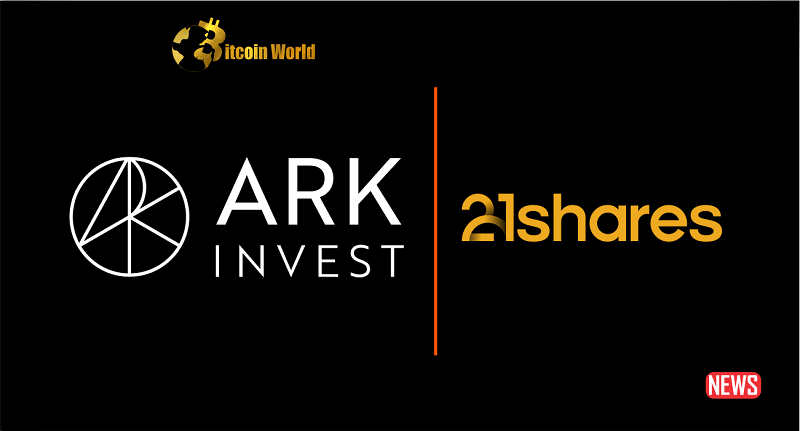The world of cryptocurrency is buzzing with anticipation again. Despite facing previous setbacks, the dynamic duo of Cathie Wood’s Ark Invest and the European crypto investment firm 21Shares are back in the ring, making their third attempt to secure approval for a spot Bitcoin exchange-traded fund (ETF) in the United States. With Bitcoin currently hovering around $28,381, could this be the catalyst that finally opens the floodgates for broader crypto adoption?
Why the Persistent Push for a Spot Bitcoin ETF?
For those unfamiliar, a spot Bitcoin ETF is a financial product that directly tracks the price of Bitcoin. Think of it like this:
- Direct Exposure: Instead of buying and holding actual Bitcoin, investors can buy shares of the ETF, which represent ownership of Bitcoin held by the fund.
- Simplified Access: It makes investing in Bitcoin as easy as buying stocks through a traditional brokerage account. No need to navigate crypto exchanges or worry about wallet security.
- Potential for Broader Adoption: This accessibility could attract institutional investors and individuals who are currently hesitant to directly engage with cryptocurrencies.
Ark Invest and 21Shares initially submitted their application for a spot Bitcoin ETF on June 28, 2021. However, the SEC rejected it in April 2022, citing concerns under the Exchange Act and its own guidelines for listing financial instruments. Undeterred, they tried again in May 2022, only to face another rejection on January 26 of this year. So, why the renewed optimism with their April 25th resubmission?
The SEC’s Stance: A Wall of Skepticism?
The Securities and Exchange Commission (SEC) has consistently voiced concerns regarding spot Bitcoin ETFs, primarily focusing on:
- Investor Protection: The SEC wants to ensure safeguards against fraud and manipulation in the underlying Bitcoin market.
- Market Surveillance: They seek robust mechanisms to monitor trading activity and prevent illicit practices.
This stance is particularly interesting considering the SEC has already approved several Bitcoin Futures ETFs. What’s the difference, you might ask?
| Feature | Spot Bitcoin ETF | Bitcoin Futures ETF |
|---|---|---|
| Underlying Asset | Actual Bitcoin | Contracts that bet on the future price of Bitcoin |
| Price Tracking | Directly reflects the current market price of Bitcoin | Reflects the price of futures contracts, which can sometimes deviate from the spot price |
| Investor Exposure | Direct exposure to Bitcoin price movements | Indirect exposure through futures contracts, potentially involving roll costs |
Critics argue that by approving futures ETFs but not spot ETFs, the SEC is offering investors a less direct and potentially more costly way to gain exposure to Bitcoin. This apparent contradiction has fueled frustration within the crypto community.
A Glimmer of Hope: The Grayscale Lawsuit
While the SEC has remained firm in its denials, there’s a potentially significant development on the horizon. Digital Currency Group (DCG), the parent company of Grayscale, has filed a lawsuit against the SEC for rejecting its application to convert the Grayscale Bitcoin Investment Trust (GBTC) into a spot Bitcoin ETF.
According to Grayscale’s Chief Legal Officer, Craig Salm, the litigation is progressing swiftly, with oral arguments potentially occurring as early as Q2 2023. Bloomberg ETF researchers even suggest that a spot Bitcoin ETF could materialize in the US by the middle of this year, largely due to the pressure from this lawsuit.
Why Should You Care About Spot Bitcoin ETFs?
The approval of a spot Bitcoin ETF could have far-reaching implications:
- Increased Legitimacy: It would signal a greater acceptance of Bitcoin as a legitimate asset class by regulatory bodies.
- Influx of Capital: Institutional investors, who often face restrictions on directly holding cryptocurrencies, could allocate significant capital to the market through ETFs.
- Reduced Volatility (Potentially): Increased liquidity and broader participation could potentially lead to more stable price movements.
- Easier Portfolio Diversification: Investors could easily diversify their portfolios with Bitcoin exposure without the complexities of direct ownership.
Challenges Remain
Despite the potential benefits, challenges persist:
- Regulatory Uncertainty: The SEC’s stance remains the biggest hurdle. Even with the Grayscale lawsuit, the outcome is uncertain.
- Market Volatility: Bitcoin’s inherent volatility could still make spot ETFs a risky investment for some.
- Custody Concerns: Ensuring the secure custody of the underlying Bitcoin held by the ETF is crucial.
Actionable Insights: What to Watch For
Here’s what to keep an eye on:
- SEC Decisions: Monitor the SEC’s response to Ark Invest and 21Shares’ latest application.
- Grayscale Lawsuit Updates: Follow the progress of the legal proceedings and any rulings.
- Regulatory Statements: Pay attention to any public statements or policy changes from the SEC regarding cryptocurrency regulation.
- Market Sentiment: Track how market sentiment shifts in response to regulatory news.
The Road Ahead
The journey towards a spot Bitcoin ETF in the US has been a marathon, not a sprint. The persistence of companies like Ark Invest and 21Shares highlights the strong belief in the value and demand for such a product. While the SEC’s skepticism remains a significant obstacle, the ongoing legal challenges and the potential for broader market access could eventually pave the way for approval. Whether this third attempt will be the charm remains to be seen, but one thing is certain: the crypto world will be watching closely.
Disclaimer: The information provided is not trading advice, Bitcoinworld.co.in holds no liability for any investments made based on the information provided on this page. We strongly recommend independent research and/or consultation with a qualified professional before making any investment decisions.




